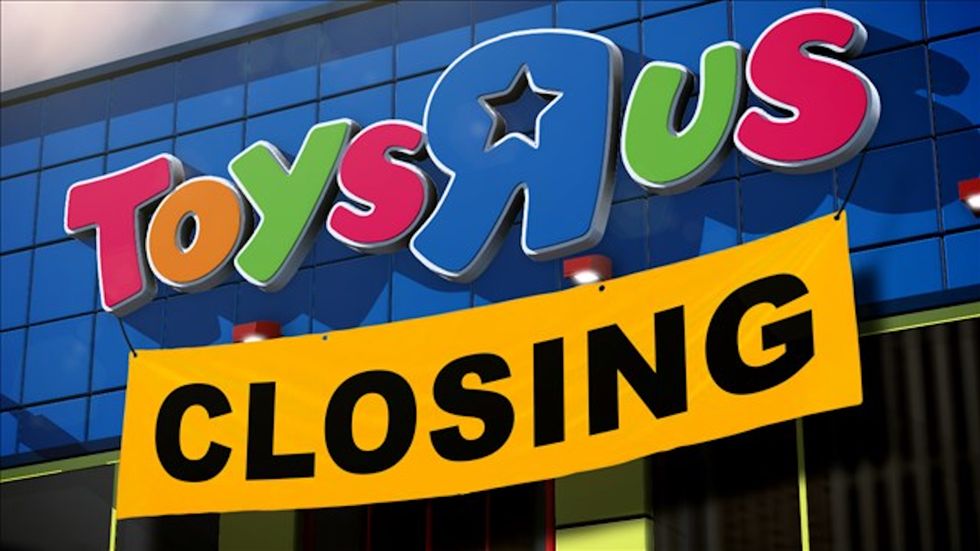Seventy years ago, a young twenty-five-year-old man by the name of Charles Lazurus founded Toys "R" Us—a company that was destined to skyrocket following the baby boom of the late 40's. Stories of his early rising as the corporation's CEO might lead one to view him as an authentic Mr. Magorium. True to his moniker, Lazurus represented numerous admirable qualities as a toy store owner. He frequently visited the stores and was observed humbly engaging with customers of all ages. His successor, Michael Goldstein, stated that "his face lit up when he watched the kids playing with toys." The company rapidly grew over the course of time starting at $1 billion and flourishing to an outstanding $11 billion enterprise by the early 90's.
Over the past ten years, the rise of electronics and online shopping have caused countless toy stores to go out of business such as the formerly popular KB Toys. As of Wednesday, March 14, Toys "R" Us publicly announced the upcoming closing of all retail stores in the UK and U.S. A week later, the company released a statement confirming the heartbreaking death of the ninety-four-year-old founder, Lazurus.
While online shopping websites have become increasingly popular and have undoubtedly attributed to the accelerated decrease in sales at free-standing toy stores across the nation, the transformation of children's interests is at the forefront of these businesses' deficiencies.
Today, children are raised observing their older siblings begging for smart phones for Christmas before even reaching their early teens. Shortly after having learned to speak, children are now known to throw tantrums that often resulted in the 'parenting technique' of having an electronic device thrust into their hands to keep them quiet while their parents attempt to go about their daily errands. At this stage, cognitive and social development is crucial. However, this wave of technological advancement appears to alter any hope for such progress. Rather than go outside to play games with the neighborhood kids and meet new friends, the average child is found to have a deeper longing to remain indoors with a touchscreen at their fingertips. Yet we continue to wonder why our children have difficulty developing friendships and paying attention upon entering school when they are given the privilege of essentially unrestricted use of technology at home.
Assuming that electronics are the leading issue in the weakening of toy stores nationwide as well as the steady impairment of our youth's social conduct, allow us to observe the difference between the popular toys of the 1940s and those being sold today. Baby boomers grew up playing with slinkies, Yo-Yos, Jacks, slingshots, pogo sticks, Lionel Trains, Tonka Trucks, and Red Ryder BB guns. However, of all of these toys, board games appeared to be the most popular which encouraged friends and families to play together thus boosting childhood socialization. A trip to the toy store was viewed as a treat that children once looked forward to even if they knew they were only allowed to peruse the aisles containing 98 cent tin toys—something fundamentally unheard of today.
As of 2018, 'toys' such as the Nintendo Switch, Super NES Classic Edition, BB9E App-Enabled Droid, SELFIE Mic Music-Set, Sky Viper V2400 HD Streaming Drone, iPod Touch, Amazon Echo Dot, and Bluetooth Wireless Headphones seem to be the leading products listed as toys on the market. Perhaps the most heart-rending of these toys in comparison to those listed in the 40s is the growing demand for virtual reality headsets. The fact that children still subconsciously seek outdoor play without actually going outside is unnerving.
This said, what is the point in going to a toy store if the majority of these products can be purchased online without parents experiencing the inevitable headache that will follow the distraction of pricier products that they did not initially intend to purchase upon their visit? The convenience of online shopping while not the central issue, contributes to the problem. If parents finally succumb to placing a tablet or gaming system into the hands of their children, they are no longer enticed by other toys that may encourage healthy lifestyles and social activity. With the universal accessibility offered through electronics, there is no need to leave the comfort of their homes. Apps and games can now be purchased instantly without having to so much as ask mom or dad for the credit card.
While society appears to be the problem at large, we as parents, teachers, babysitters, and mentors still have the power to turn this around through collective effort. If a single parent were to enforce the limitation of electronic use, this would appear unfair and rightfully so as many children's friends do not adhere to the same rules. If more parents were willing to reach out to one another specifically with the other parents of their children's friend groups, a standard for acceptable electronic use could be made. Children need to be encouraged to willingly engage in social activities, sports, and playdates. This needs to be suggested in an appealing way so that it appears to be their own idea. If we can recall anything from our childhood, it may be the fact that nothing is fun unless it is done of our own accord. Planting the seed for friendships and activities not involving touchscreens should become a daily routine in our parenting skills. Otherwise, it is difficult to know for certain whether we are raising young leaders or mindless robots who are destined to contribute little more to our future society as they program forthcoming technologies that will further corrupt the following generations.















